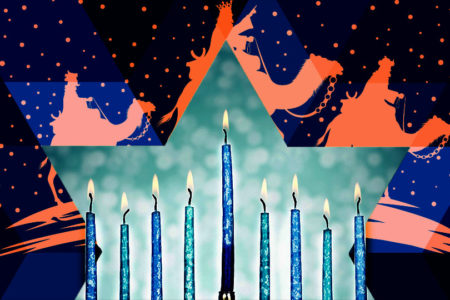Herod the ‘Believer’
The learned magi in the strange caravan were asking dangerous questions when they arrived in Jerusalem. Their quest had taken them on a long journey from the East, where their study of the stars and basic knowledge of Jewish prophecy had convinced them Jerusalem would be where they would find the answer to their question, “Where is He who has been born King of the Jews?”
The city was buzzing. A King was born? A King of the Jews? Where? When?
It didn’t take long for King Herod’s network of informers to relay the news to the palace. Unknown to the magi, their questions could mean trouble for everyone under the strangling authority of the ruthless Herod the Great.
Reports of a prophetically promised Jewish King sent the ever-paranoid Herod into a state of intense agitation and emotional distress. He was well aware that, as an Edomite usurper backed by Rome, he had no divine right to the throne of David. He had already proven he had no scruples. When it came to protecting his dominion, even members of his own family felt his murderous blows.
The truth about the birth of this King was not a secret. The Jewish prophets had proclaimed God’s promise to send a Messiah-King who would redeem and rescue. The skies over the shepherds’ fields near Bethlehem had burned with God’s glory when the angelic host ruptured heaven’s veil to proclaim good news of great joy for all people.
Their truth-filled message was clear and concise: “For there is born to you this day in the city of David a Savior, who is Christ the Lord” (Lk. 2:11). The shepherds quickly told all who would listen about the things they saw and heard. God even had placed a miraculous star in the heavens to proclaim the Messiah’s birth far and wide.
The newborn King’s arrival was clearly visible to all who were waiting and watching. As the truth spread, those who heard and believed reacted. Some were filled with worship. Some were filled with wonder. Some were filled with worry. Some were filled with wrath.
Worship
The magi, skilled in watching the movement of the stars and planets, knew the astronomical phenomenon they observed was “His star,” the star of the One who had been born King of the Jews. Their search for the star’s meaning led them to an ancient Jewish prophecy in Numbers 24:17: “A Star shall come out of Jacob; a Scepter shall rise out of Israel.”
Somewhere, somehow, crumbs of prophetic truth had been scattered in the East during the Jewish captivity in Babylon and Medo-Persia. Perhaps the teachings of the Jewish prophet Daniel, who once led the royal counselors of those great empires, were still available in areas there. The details of the magi’s research are not known; but just as they were divinely led by the star, there can be no doubt their search for its meaning was also divinely guided.
Though faced with an apparent dead end, they were not deterred. They had set out on this journey for one reason: to “worship Him” (Mt. 2:2). Their inquiries in Jerusalem were rewarded. When they heard Bethlehem was the prophesied birthplace of the King, they left Jerusalem and again were wondrously guided by the star. It “came and stood over where the young Child was” (v. 9). When they saw the Child, they “fell down and worshiped Him” (v. 11).
The magi were groomed in pagan wisdom and practices. Yet they believed the star was a divine message. They believed the prophetic words of the God of Abraham, Isaac, and Jacob. They believed and acted on the truth they saw and heard. In a leap of faith, they embarked on a daunting and costly journey in order to fall down at the feet of the One who had come to save them from their sin.
What motivated their passion to worship Him? How much did they truly understand? No one knows. However, it is astounding that a group of Gentiles responded to the truth they were given, made such an arduous journey, brought valuable gifts, and worshiped Jesus as King of the Jews.
Wonder
The first Christmas was full of astonishing events for the people in and around Bethlehem. As the shepherds broadcast what they were told about the newborn, all who heard were filled with wonder (Lk. 2:16–18). A heavenly host, a babe in a manger, good news and great joy for all people, a Savior—Christ the Lord!
With such an announcement, there should have been no doubt this was the promised Messiah-King. But feelings of surprise and wonder don’t necessarily guarantee a willingness to put faith in what may seem almost too good to be true.
Apparently, the impact of the shepherds’ extraordinary report didn’t last long or spread far. Jerusalem was less than six miles away. Yet this wonderfully good news of great joy seems to have made little or no impression on the people or religious leaders there. Much like modern Christmas celebrations, the excitement and joy surrounding the truth of the coming Savior quickly faded as life returned to business as usual.
Worry
The magi’s search for the newborn King shattered the tenuous status quo in Jerusalem. “When Herod the king heard this, he was troubled, and all Jerusalem with him” (Mt. 2:3). Jerusalemites knew full well that when Herod felt threatened, he boiled like a volcano with the potential for a merciless, fanatical eruption.
Herod’s growing anxiety was paralleled by a rising foreboding throughout the city. Talk of a promised Messiah only made life more uncertain and difficult for everyone. People often find the discomfort of oppression easier to live with than the precariousness of an uncertain hope.
Wrath
The wrath in Herod’s heart finally manifested itself in a sinister plan to destroy this rival King whose birth the star announced. Herod summoned the religious scholars and leaders to tell him the prophetic truth regarding the Messiah’s birthplace. The answer was simple: “But you, Bethlehem, in the land of Judah, are not the least among the rulers of Judah; for out of you shall come a Ruler who will shepherd My people Israel” (v. 6; cf. Mic. 5:2).
The truth was all Herod needed to set his scheme in motion. He would begin by using the magi to find the Child and report back His whereabouts, telling them he also wanted to worship this King of the Jews.
Yet all did not go as expected. After finding Jesus, the magi immediately set out on their journey home, warned by God not to return to Herod. When Herod realized his scheme had failed, his wrath exploded. He ordered the extermination of all males two years old and younger in Bethlehem.
Responding to Truth
In one way or another, the magi, shepherds, people of Bethlehem, citizens of Jerusalem, religious leaders, and Herod all believed and acted on some measure of divine truth about the Messiah’s birth. They all decided what that truth meant to them individually and how to respond to it. Their responses were predicated on how they believed the truth would impact their lives.
Much is made of the fact there was no room in the inn for Mary and Joseph, and the biblically nonexistent innkeeper is often reproached for his harshness. But the most unsettling failure on that first Christmas is that Jesus “came to His own, and His own did not receive Him” (Jn. 1:11).
Busy with the affairs of life, some people were temporarily filled with wonder. Not wanting trouble, others decided not to get involved. Those who believed the coming King of the Jews would ruin their lives and take away their power reacted savagely and arrogantly against this intrusion from God.
Even today, the true Christ of Christmas is still being displaced in lives by temporary wonder, worry, apathy, arrogance, and wrath. Yet 2,000-plus years since the Savior’s birth, His invitation of grace still stands: “As many as received Him, to them He gave the right to become children of God, to those who believe in His name” (v. 12).









Another excellent article by Clarence Johnson. The insight he provides is unique and thought provoking. May the Lord continue to bless Clarence and the ministry of FOI.